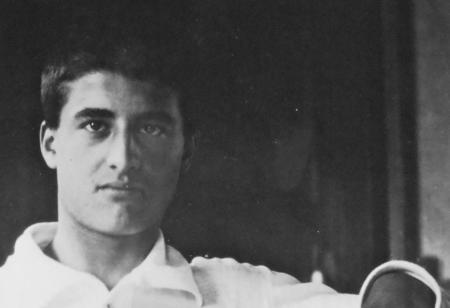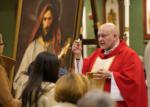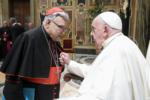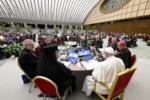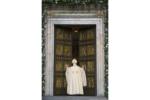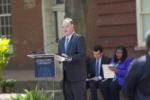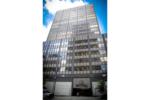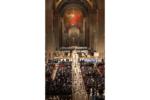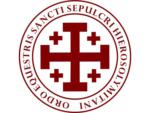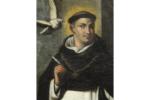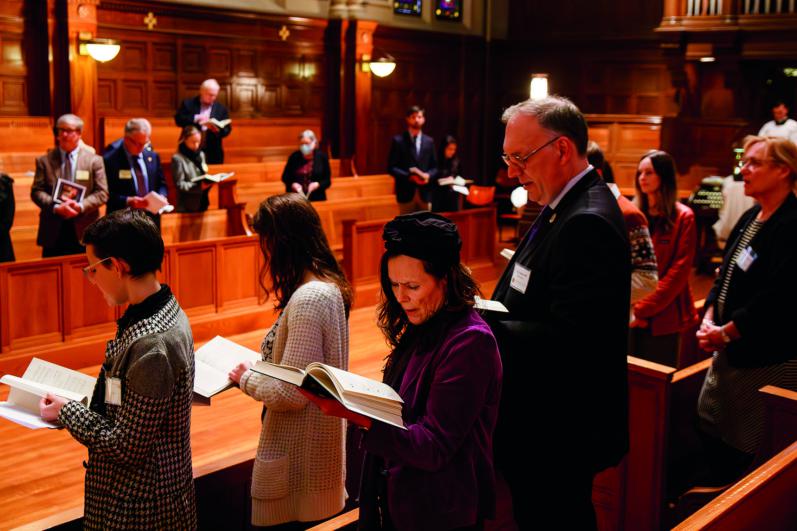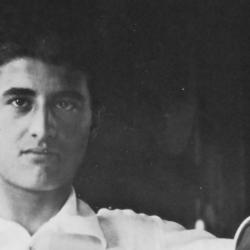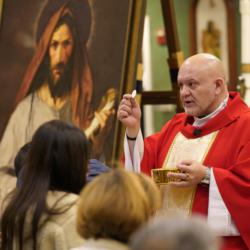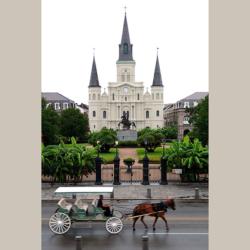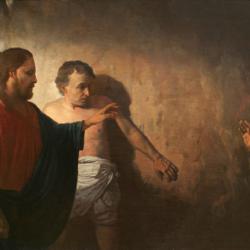Catholic physicians gather for annual White Mass
BRIGHTON -- To Dr. Laura Rabideau, being a primary care internist is more than a job. It is a calling.
"I think God has a vocation for each one of us, and calls us to use our gifts," said Rabideau, a member of the Guild of St. Luke. "My faith has led me along this path."
Rabideau and about 30 other Catholic medical professionals celebrated the Guild of St. Luke's annual White Mass at St. John's Seminary in Brighton on Oct. 14.
"It helps me to orient my work to a wider purpose," Rabideau said about the Mass. "And to be able to talk about my faith in the context of my work with people who understand."
The White Mass takes place every year around Oct. 18, the feast of St. Luke. Guild President Dr. John Barravecchio said that the White Mass has occurred throughout the guild's history but became an annual tradition when Cardinal Bernard Law "revived" it in the 1990s.
"It's something that is important for Catholic physicians," Barravecchio said. "To get together, given the general antipathy to a Christian view of anthropology that we are surrounded by. It's good for fellowship and mutual support."
The White Mass is typically celebrated by Cardinal Seán P. O'Malley. Since he is in Rome to participate in the Synod of Bishops, Msgr. Timothy J. Moran, chaplain of the Guild of St. Luke, celebrated the Mass in his place.
In his homily, Msgr. Moran called priests "physicians of souls."
He said that the phrase "healthcare provider" -- a term familiar to those celebrating the White Mass -- is "a very dim phrase" to describe the deep relationship between doctors and their patients.
"What a joy it is to be able to work with God, the provider of life," he added, "and be amazed by that gift."
While physicians' "love of healing" has given them the opportunity to "work with the spirit," Msgr. Moran said that their busy lives should not distract from "that extra grace that God has bestowed upon you."
"Do your daily work filled with the wonder of all that God is doing," he told them, "with and for us each day."
During Mass, Barravecchio said a prayer for patients.
"May the Lord sustain them in his love," he said, "and may the Lord make us more generous servants to them in his name."
He also prayed for the Guild of St. Luke and its deceased members.
"For those who exercise the art and skills of healing," he said, "may God allow us to be and do our very best."
After Mass, guild members gathered for dinner in the seminary refectory, where they heard an address by Craig Treptow, president of the Catholic Medical Association.
Treptow gave a brief overview of the history of the Guild of St. Luke. Founded in 1911 by Cardinal William O'Connell, it is one of the oldest Catholic medical societies in the United States. At the time of its founding, Cardinal O'Connell was concerned about the use of medical science in ways contrary to Catholic teaching, including the sterilization of criminals, euthanasia, and "artificial reproductive methods."
"It's amazing that some of these same topics are going on again," Treptow said.
Like Msgr. Moran, Treptow told the guild that their workaday lives should not distract from their responsibilities as Catholics. He said that the greatest individual challenges to Catholic physicians are isolation and lack of knowledge, especially when they are asked to do something that goes against their faith.
Treptow said that guilds like the Guild of St. Luke are crucial in promoting the Catholic stance on medical issues, including abortion and physician-assisted suicide, as well as protecting "freedom of conscience" for Catholics in the medical profession. However, he noted that many Catholic medical guilds are suffering from "malaise" and inactivity.
"But your guild is not," he said, "and I applaud you for doing that."
He highlighted the Catholic Medical Association's resources that are available for Catholic physicians, including a "hotline" for moral issues, an online discussion forum, and a catechism-based phone app for those "who want to learn how to apply the intellectual tradition of the Catholic Church in the healthcare setting."
Treptow ended his remarks by saying: "God put us here in this moment for a purpose, each one of you. Let us listen to him and make a difference."
